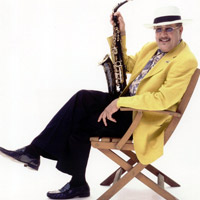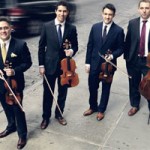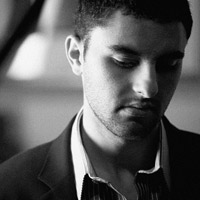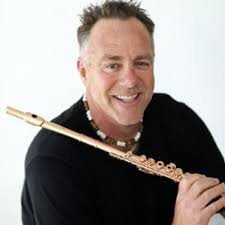The Blistering Virtuosity of Paquito D’Rivera
When Paquito D’Rivera hit these shores as a Cuban political refugee in the early 1980’s his reputation as a sui generis, multi-stylistic innovator was already well established. He was scooped up almost immediately by Dizzy Gillespie and was soon featured with the finest Latin all stars on the East Coast. In quick order, he became the first musician to receive Grammy awards in Classical and Latin music. He remains a truly protean musician.

Paquito D’Rivera, used by permission of La Jolla Music Society
The Wednesday, August 16, concert at the Museum of Contemporary Art San Diego’s Sherwood Auditorium in La Jolla under the aegis of La Jolla Music Society’s SummerFest pitted the virtuoso alongside several outstanding musicians and one very good string quartet. The program was ingeniously curated to show off D’Rivera’s breathtaking skills.
Astor Piazzolla’s (1921-1992) “Concierto para Quinteto for Clarinet and String Quintet” from 1981 was arranged from the original by Gabriel Senanes. The piece brought out the fine ensemble work of the Escher String Quartet, who attacked the entire evening’s fare with gusto. The combination of the four strings along with the addition of contrabassist Pablo Aslan established an ideal platform for D’Rivera to soar. Piazzolla’s work combines a deep sense of traditional Argentinian tango which is defused through modernist, European harmonies. Although strongly tonal, the music posits a highly profiled approach to “serious” music that is still deeply rooted in popular traditions.
D’Rivera was its perfect interpreter. His ability to make stylistic quantum leaps left this listener breathless. Transitioning seamlessly from completely composed passage work to totally improvised jazz solos, the clarinetist never missed a mark. Concluding each solo in a tight, unison passage that left no room for miscues, he seemed to truly be composing in real time. I have never experienced such cross-stylistic dexterity and the result was exhilarating.

Escher String Quartet [photo (c) Sophie Zhai]
D’Rivera’s “Four Pieces from the South for Clarinet, Piano and String Quintet” provided the evening’s largest and most wide ranging experience. Witnessing D’Rivera’s outrageous style hopping (from written to improvised), it became more and more apparent that everything he does is as of one piece. To wit, his composed melodies sound eerily similar, though maybe a tad less interesting, than his improvisations. All was delivered with a profound temporal integrity – never rushing or dragging – that one rarely experiences.
A further aspect of his artistry that I have never encountered at such an extraordinarily elevated level was the clarinetist’s absolutely blazing, blistering, assured and perfect technique. His digital chops are simply on another, supernal level from anyone else’s. I would say that as a pure “classical” player, he leaves a lot to be desired in terms of sound and phrasing, and if it were to come down to a performance of the Brahms’ Sonatas or the Mozart Concerto, for instance, there are dozens of players I would rather listen to. But on Wednesday’s program, D’Rivera got to be The World’s Greatest Paquito D’Rivera. And there is clearly only one of him: no one comes close to this man’s specific and remarkable artistic abilities.

Alex Brown: used by permission of La Jolla Music Society
During the “Four Pieces,” we were treated to a guest appearance by his Summerfest colleague, clarinetist Burt Hara, a marvelous musician in his own right. Offering a hilarious send up in trying to get Hara to “spontaneously” take the stage, the audience was treated to an extremely fine interpretation of D’Rivera’s own “Vals Venezolano” (1990).
Perhaps saving the best for last, D’Rivera and pianist Brown closed the evening with a set of “Improvisations” announced from the stage. The audience was treated to a “musicological” lecture worthy of Prof. P.D.Q. Bach, delivered in his thick and charming Cuban accent. In this “lecture,” we learned that Mozart was actually not Austrian but instead, from New Orleans and that Chopin was not Polish but instead, Brazilian. Who knew? The duo then went on to give one of the most hair-raising, virtuoso displays, transmogrifying melodies from Mozart, Chopin, Charlie Parker, Dizzy Gillespie and who-knows-who-else into a delightful, fractured, thoroughly post-Modern, postprandial delicacy. The ingenious outpouring of nonstop musical ideas left everyone in the house gasping for breath. Genius was in the air.

Yochanan Sebastian Winston, Ph.D. has performed throughout the United States, Europe and Latin America. His repertoire spans classical, jazz, klezmer, new age, contemporary, rock & roll and pop and is very active as a composer. Dr. Winston holds a Ph.D. from the UCSD, a Diplôme from the Conservatoire National de Region de Boulogne-Billancourt (France), and a Master’s and Bachelor’s of Music from the Manhattan School of Music in New York City.


